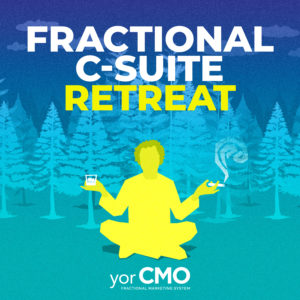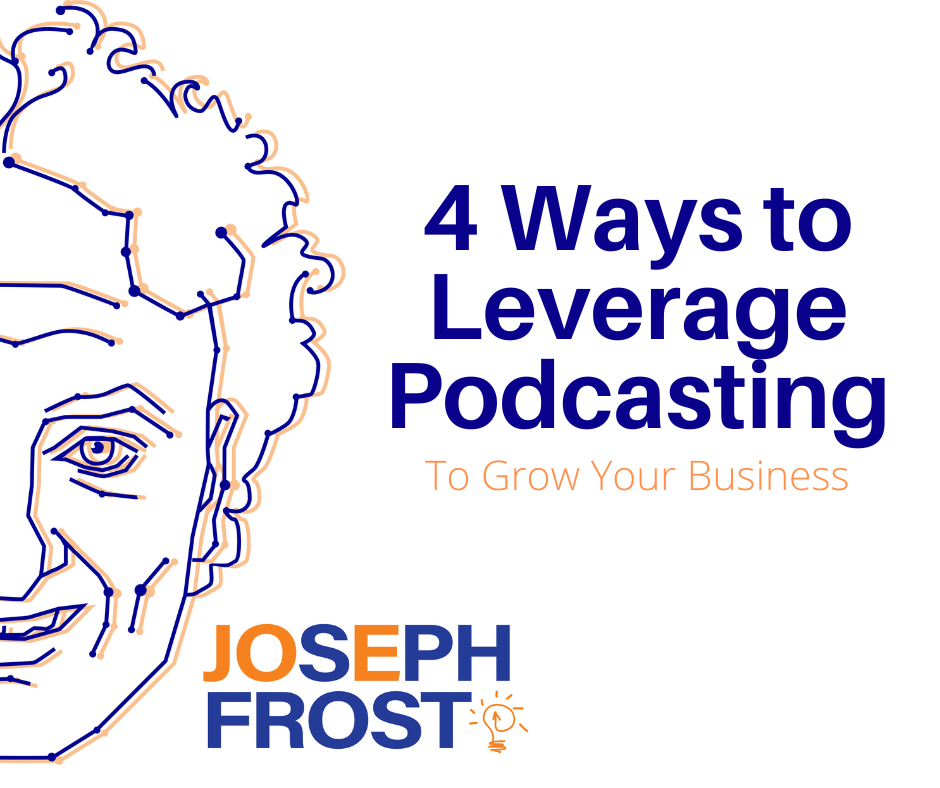When I first launched my podcast, The Fractional C-Suite Retreat, I had no idea what would come from it. The actual process of making a podcast is surprisingly straightforward. The three key ingredients: a computer to record the podcast, a good microphone to capture your voice, and a software program to edit your audio. (Some say a fourth requirement is an attractive voice…but if I made it, so can you.)
The hardest part of podcasting? It’s nothing related to sound engineering or fancy marketing strategies. It’s the ability to find that bedrock idea that ties it all together.
A unique angle is critical – and with the rapid growth of podcasts as a media form built for communities, going niche and specific is key. However, the most important element I’ve learned throughout my podcasting experience: identifying a purpose for the podcast you want to launch.
Podcasting is an exercise in longevity. Identifying a big mission or purpose – the reason why you started this thing in the first place – will propel you forward on the days you feel too busy or too low on energy. Most likely your purpose lies in the audience you strive to inspire or the feeling you get when you are deep in discussion with a guest. Financial gains will come, but lead generation and monetary ROI cannot be the primary motivator (money alone is never a sustainable driver for anything, I’ve learned).
The results and impact a podcast creates far outweigh the challenges. The benefits are so significant that I believe every entrepreneur, leader or fractional professional should consider incorporating a podcast into their business model. The reasons are straightforward.
Branding & Marketing
When I first started my podcast, I knew I wanted it to support the latest business I was building (yorCMO: a fractional CMO company). I was quickly getting fascinated with the fractional model of work – and I wanted a platform to share my excitement for it while speaking directly to the audience my business was targeting.
A podcast is a marketing channel – and it can be a key part of a strategic marketing mix. But there was one small difference:
The podcast wasn’t a Facebook ad being spread across the internet by a faceless corporate brand. The podcast was me: my voice, my thoughts, the types of guests I felt excited about speaking to. It was my brand.
What came out was:

The concept is simple: a show meant for an executive audience to listen to while unwinding and learning about various issues affecting the C-suite. I had always loved (still do) reading, listening to a podcast or writing over a cigar in my backyard after a long day. I figured other busy leaders might already be doing the same thing I did, and they might want to join in my cigar-fueled audio retreat.
While branding the podcast, I was able to brand my company and myself at the same time to my listeners. Talking about shared experiences with my guests makes listeners associate certain feelings with me and, by extension, the company I founded. The podcast began to act as a supporting pillar of my corporate brand’s marketing and my own personal brand’s marketing.
What’s more: a steady flow of episodes started to fuel content for social media accounts.
From a branding perspective, a podcast can be invaluable: it can create some valuable online engagement for your brand(s) while giving you marketing content for your other channels.
Audience Connection and Authoritative Presence
The name of the podcasting game? Creating personal connection in today’s disconnected world.
Podcasting establishes a more direct connection to your audience. While blogs and posts on social media are used to connect with your audience, podcasting has a unique place in the social media landscape. Your audience hears your voice and mannerisms in ways that texts cannot compete with.
Do podcasts for a long enough time, and you will have an audience who simply loves listening to your (and your guests’) thoughts. If your voice is an authentic one, and if you hold back from the temptation to make everything “perfect,” your audience will see you as an authoritative figure on your core topic; they’ll get to know you, and feel you understand them; and inadvertently they’ll develop a sense of trust.
The goal isn’t to be a “thought leader”; it’s to be an unfiltered, interesting, reliable lighthouse standing out in a crowded sea of voices guiding your audience home. Be the lighthouse!
New Avenues for Online Presence
Whether for your corporate brand or for your personal brand (or both, if they are interconnected), a podcast is a smart way to reach audiences outside of your immediate industry or network.
Podcasting helps your business reach an audience disconnected from but adjacent to all your other marketing channels. Traditional marketing rhetoric tells us to be on “every” social media platform – but more often than not we end up focusing on one platform above the rest (which is likely a smarter strategy). Most commonly, it’s the one where the biggest concentration of our target audience is found.
Podcasting is, in some ways, natively disconnected from a singular social media platform – which means it creates opportunities to reach people you have never met, known about, or marketed to.
According to the Infinite Dial 2021 survey by Edison Research on digital media consumer behavior in the United States, 41% of the US population listens to podcasts monthly. In 2012, this percentage was only 14%.
It’s a rapidly-growing segment – one that is diversifying in terms of appeal. The same survey notes that podcast listeners’ demographics (gender, ethnicity, and age) are diversifying just as rapidly. The interest in podcasts is not only an American phenomenon: Latin America and Asia Pacific, for example, have seen remarkable growth.
The point: podcasting creates new avenues for new exposure to new audiences – and despite what seems like a “crowded” podcasting market, in some ways it’s still in its infancy as a channel to reach and inspire audiences.
Building a Learned Community
Nothing beats honest intellectual conversations.
A main (and understated) benefit of podcasting: getting to have conversations with smart, interesting people. I’ve had many wonderful guests of various backgrounds on my podcast, from whom I learned so much about different facets of business. One week I am talking to a world-class expert about modern-day marketing; another week on company culture; the next about the future of work.
Beyond the concepts related to your core topic (in my case, executive business leadership issues), I’ve learned so much about psychology, philosophy, health, strategic thinking, relationship-building, and much more. The guests I’ve had on my podcast continuously remind me and my audience that no matter how experienced you may be in your field of expertise, there are always new things to learn.
Moreover, the simple act of having guests on a weekly podcast builds a sense of community: I’ve expanded my network and audiences exponentially; built real relationships I will hold onto; and have received messages on how I’ve inspired others to achieve their goals. Even if a podcast is by default a one-way conversation, a community gets created where people can exchange, learn and grow. It’s remarkable, really.
Whether you are a seasoned entrepreneur or a C-level leader who made the recent leap to go fractional, I believe podcasting can help your business grow.
My suggestion: give it a try. Start with a mission and purpose – and who knows where the podcasting journey can take you from there?
——
Joseph Frost is a Decentralized Entrepreneur, University Professor of Entrepreneurship & 3X Founder. He is the Founder of yorCMO, the first Decentralized Leadership franchise business, and is the head of the Fractional Professionals Association, the first & only community for decentralized, fractional executives & leaders looking to join the future of work. He is also the host of the weekly podcast “The Fractional C-Suite Retreat.”


